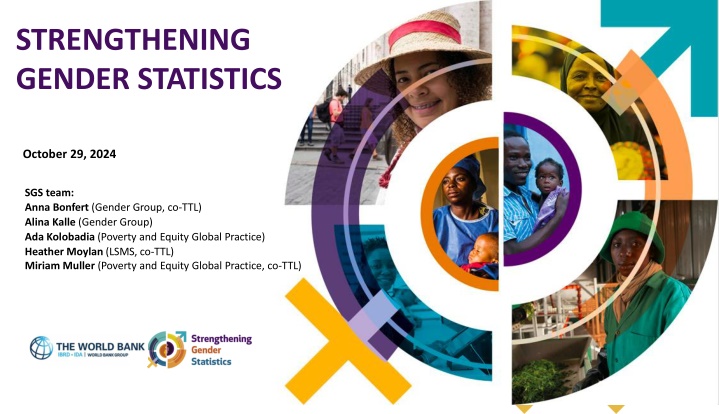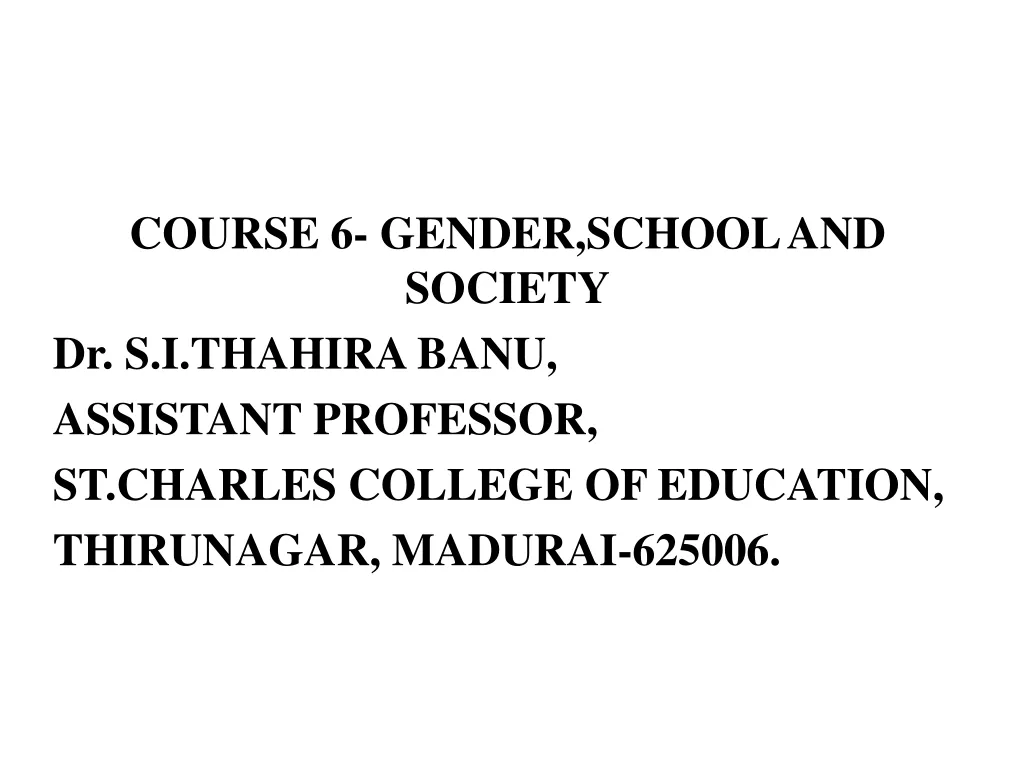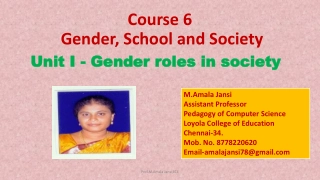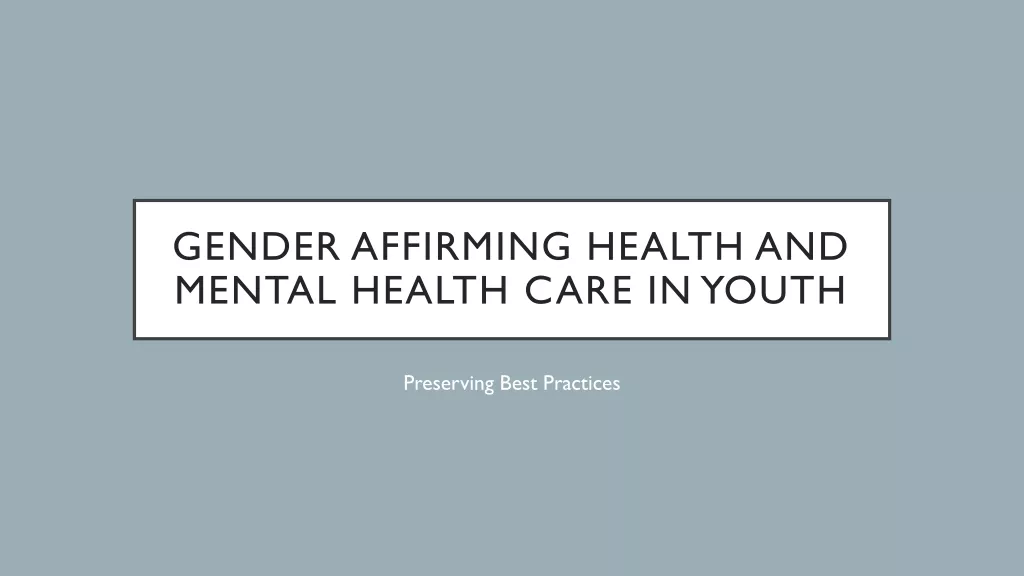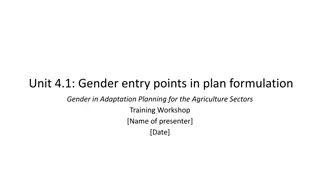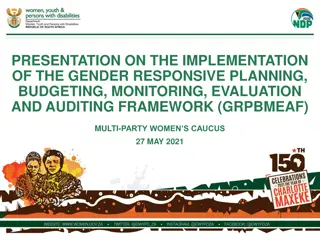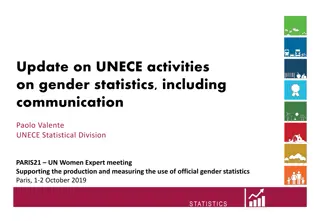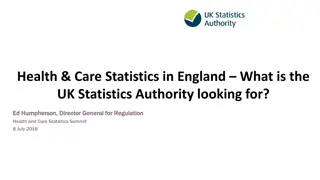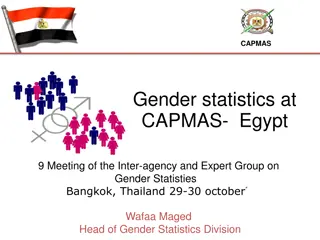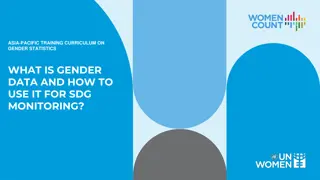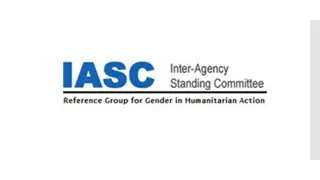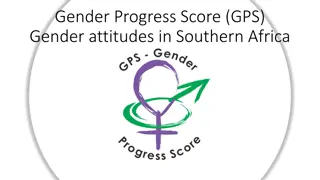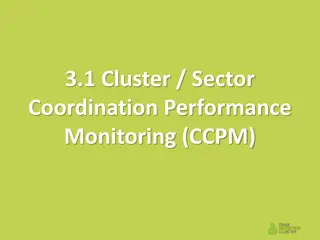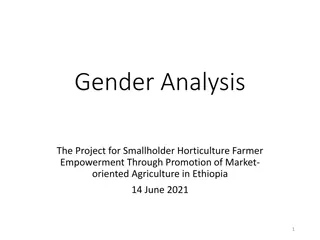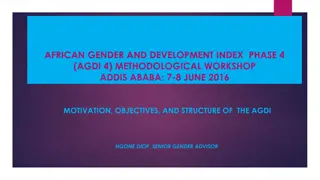Strengthening Gender Statistics Project Progress
The Strengthening Gender Statistics project has made significant strides over the past 4 years, focusing on global knowledge and guidance materials, training courses, data production support, and gender data dissemination. The team has worked with partner countries and engaged in knowledge sharing through a Community of Practice. Moving forward, the project aims to enhance data dissemination, production, and uptake, while continuing to engage with stakeholders and provide support for survey methodologies.
Download Presentation

Please find below an Image/Link to download the presentation.
The content on the website is provided AS IS for your information and personal use only. It may not be sold, licensed, or shared on other websites without obtaining consent from the author.If you encounter any issues during the download, it is possible that the publisher has removed the file from their server.
You are allowed to download the files provided on this website for personal or commercial use, subject to the condition that they are used lawfully. All files are the property of their respective owners.
The content on the website is provided AS IS for your information and personal use only. It may not be sold, licensed, or shared on other websites without obtaining consent from the author.
E N D
Presentation Transcript
STRENGTHENING GENDER STATISTICS October 29, 2024 SGS team: Anna Bonfert (Gender Group, co-TTL) Alina Kalle (Gender Group) Ada Kolobadia (Poverty and Equity Global Practice) Heather Moylan (LSMS, co-TTL) Miriam Muller (Poverty and Equity Global Practice, co-TTL)
SGS project: progress over the past 4 years Global knowledge and guidance materials 4 guidance documents published 6 training courses developed Technical Support to Data Production Preparatory Work Data Analysis and Report Writing Data Dissemination Gender Factbook Training Survey Methodology Workshop Factbook published Questionnaire Review Indicator Calculation Training Gender Data Gap Assessment Dissemination Event Onboarding Workshop 10 partner countries 11 partner countries 13 trainings for partner countries 12 partner countries 12 7 factbooks published >200 indicators calculated >150 survey practitioners trained 12 partner countries 22 4 events hosted partner countries reviewed surveys 19 engendered surveys 13 nonpartner countries 8 factbooks in finalization 16 1 regional training (5 nonpartner countries) nonpartner countries Knowledge sharing & communication strategy Community of Practice (CoP) with over 100+ members, who received 8 CoP events and 7 newsletters SGS participation in 7 global gender data events 7 training sessions for WBG staff 1 website with all SGS resources 10 blogs
SGS project: forward-looking agenda Data dissemination & uptake Global knowledge production & communication Data production Data analysis Review and provide questionnaire recommendations for surveys scheduled for 2024-25 Conduct indicator calculation workshops for interested partner countries Disseminate the remaining gender factbooks for partner countries Produce a results brief to summarize SGS progress and lessons learnt from Phase I Develop thematic country & sectoral briefs to ensure data uptake across World Bank projects and operations Support pilots and survey methodology workshops for surveys that adopt SGS gender recommendations Support gender report writing for remaining partner countries Organize global-level events (e.g., UNWDF 2024) Continue engagement with the SGS Community of Practice (webinars, newsletters)
Burkina Faso Communication : Rodrigue MARE, Head of Social Statistics, INSD Guissou SIBI, Director of Statistics on Household Living Conditions, INSD
PROGRAM FOR THE FUTURE: NEXT STEPS IN IMPROVING GENDER DATA 2 1 3 4 5 PRESENTS Production of gender- Capacity building on Collaboration with Participation in regional Monitoring and Improved accessibility of disaggregated data gender statistics technical and financial and international evaluating the gender gender data partners projects impact of public policies 2020 2022 2024 2021 2019 2023 Gender factbook 2019 Gender factbook 2021 Gender factbook 2023 Women and Men in Burkina Women and Men in Burkina Women and Men in Burkina Faso Faso Faso Strengthening gender statistics in Burkina Faso
PROGRAM FOR THE FUTURE: NEXT STEPS IN IMPROVING GENDER DATA 2 1 3 4 5 6 2030 2028 2025 2026 2026 2027 effectiveness of sectoral Integration of gender Gender culture in surveys and data production Integrated sectoral framework for gender Production and regular publication of the Integrating gender data into national strategies frameworks in advancing data in the formulation gender equality in key of national laws and data production minimum list of gender areas of society policies indicators Strengthening gender statistics in Burkina Faso
Cameroon Ms EVINA Fernande, Head of Centre RegionalAgency, INS gender focal point, And Mr. TATSINKOU Christophe, Project manager, INS
I- Main activities and achievements in the area of gender data over the past 4 years (within the framework of the SGS project and beyond) Production period SMS project components Activities Expected outputs Outputs obtained o o 4 indicators have Available - status 4 indicators have the status Partially available - 11 indicators have the status Unavailable - data collected 5 indicators have the status Unavailable - Data not collected. Approximately 35 people trained in 4 data visualization software packages (Datawrapper, Powerpoint, Visme, Excel) for the production of the Cameroon gender booklet. Evaluation of gender data availability Examination of questionnaire ECAM52022, EESI32021, EC- ECAM2016 Provides support to collect more and better data through the review of questionnaires and working protocols of existing surveys. September 2022 o Evaluation report o o 1. Organization of a workshop to strengthen gender statistics Organization of a workshop to calculate gender indicators using ECAM 5 data Supports capacity-building activities in data analysis, including the production of indicators following international guidelines on indicator definition Enhanced participants' skills in using stata software July 2023 2. Supports the production of publications dedicated to gender equality, such as information compendiums, brochures based on relevant gender indicators calculated from correctly collected data and indicators. calculated Factbook/booklet on gender in Cameroon in 2024 available List of 32 SGS project gender indicators completed ECAM5 gender report (SGS indicators) o Production of gender factbook/booklet 1. Production of gender data from administrative sources 2. Data analysis/indicator calculation (EESI3, ECAM5) The gender booklet has been produced The list of 32 SGS-type indicators is based on theECAM5 database. The report is currently being drafted by the joint INS/MINPROFF team. o 2024 o Strengthening gender statistics in Cameroon
Program for the future: next steps in improving gender data Production period SMS project components Activities Expected outputs Support INS in taking gender into account when designing survey methodologies where data can be collected and disseminated according to gender issues Organize capacity-building sessions for sectoral statistical units to produce gender statistics based on data from administrative sources. Dissemination Production of gender factbook/booklet Provides support to collect more and better data through the review of questionnaires and working protocols of existing surveys. 2025 and more Supports capacity-building activities in data analysis, including the production of indicators following international guidelines on indicator definition 2025 and more Factbook/booklet on gender in Cameroon in 2024 on line on the INS website ECAM5 gender report (SGS indicators) prepared and distributed Factbook/booklet on gender in Cameroon in 2024 officially presented at a workshop organized by the World Bank Data analysis(ECAM5) for the production of the gender report Supports the production of publications dedicated to gender equality, such as information compendiums, brochures based on relevant gender indicators calculated from correctly collected data and indicators. calculated 2024 Two-day workshop in Yaound on gender statistics 2025 and more Use new databases to update the factbook Factbook updated and put online Strengthening gender statistics in Cameroon
Republic of Congo Main activities and achievements in the area of gender data By: Fr d ric POUMBOU Demographer, INS-Congo October 29, 2024
Main activities and achievements of the SGS project March 2022 : Information workshop on the Strengthening Gender Statistics (RSG) project July 2022: Evaluation of gender data availability in Congo (EESIC 2011, ECOM 2012, RGPH 2007, REGEC 2020) August 2022: Creation of a gender team (15 members) within the INS September-October 2022: "Best practices for surveys" training, sessions 1 and 2 April 2023: Publication of the blog: From 0 to 20 gender indicators in just 2 years? Improving the availability of gender data in Congo (EHCVM-2022) October 2023: (i) Participation of 2 managers in the workshop to produce specific indicators (SDGs and gender) based on EHCVM data, organized in Lom (Togo); (ii) Mapping of indicators for the gender booklet in Congo. November 2023: Meeting to discuss the development of the Congo gender booklet April 2024: Calculation of gender booklet indicators based on EHCVM data Strengthening gender statistics in the Republic of Congo
Main activities and achievements in other projects 2022: UNECA - AfDB: Contribution to the production of the Gender Index for Africa (GIA) 2022: PARIS21: Videoconference "Building better gender data in Africa: challenges and prospects". 2022: UNSD: Global survey on sex-disaggregated statistics 2024 (July) AfDB - UNECA - UN Women - SADC: Sixth African Forum on Gender Statistics Program for the future: next steps in improving gender data October 2024: Verification and revision of gender booklet indicators calculated from EHCVM November - December 2024: Draft0 of the Congo gender booklet January - February 2025: Finalization and publication of the Congo gender booklet 2025 (June - July): Thematic report on gender inequalities based on RGPH-5 Strengthening gender statistics in the Republic of Congo
Djibouti Omar Moussa Ali, Director of Demographicand Social Statistics, National Institute of Statistics in Djibouti
Main gender data activities and achievements over the past 4 years (within the SGS project and beyond) -Third General Census of Population and Housing (RGPH-3), following the 2009 census. - Evaluation of gender data availability in Djibouti (with COMESA and World Bank SGS team) - Evaluation of the EDAM-4 questionnaire as part of the SGS project. - Fifth Djibouti Household Survey (EDAM-5) in preparation. - Three editions of the Gender Statistics Yearbook + Gender Booklet 2024 edition as part of the SGS project. - Implementation by UNFD of a GBV Information System (GBVIMS) operational since June 2023. - Evaluation of the statistical framework on femicide in Djibouti in collaboration with UN Women ESA. - Studies and operational research on migration and forced displacement with IOM support and a gender perspective. - Development of the National Gender Policy 2024 - 2030 - Development of a National Strategy on GBV 2024 - 2028. Strengthening gender statistics in Djibouti
Program for the future: next steps in improving gender data - Strengthen the institutional framework for the production of gender-sensitive data. - Upcoming revision of the Statistics Act and preparation of the next edition of the SNDS (2025 - 2030). - Implement a gender-sensitive National Quality Assurance Framework (NQAF). - Gender mainstreaming in sectoral policies and strategies. - Continue to conduct ongoing assessments of the gender data ecosystem. - Analysis of RGPH-3 + EDAM-5 data - MICS survey (2025 - 2026) to provide information on health and social indicators. - Quarterly employment survey (LFS) currently being prepared with the support of ILO Stats. - Continue to carry out research and in-depth studies on various gender-related themes. - Pursue national capacity-building efforts (through training, immersion courses, seminars and forums, etc.). - Develop other sources of gender data (such as Citizen Generated Data + Big Data) - Establish partnerships and collaborations with other national, regional and international institutions to strengthen the state of knowledge available on gender dynamics in Djibouti. - Set up a working group with members of the French National Assembly. Strengthening gender statistics in Djibouti
Ghana Gloria Akoto-Bamfo, Principal Statistician at the Internal and External Cooperation Directorate, Ghana Statistical Services
Key activities and achievements on gender data in the past 4 years (with the SGS project and beyond) Engagement with the SGS team Adoption of Gender Statistics Training in the generation of some economic indicators Preparation of Report in line with the indicators Adapting and inclusion of gender asset ownership model to an existing survey Exploring the use of Citizen Data to collect data on gender-based violence Strengthening Gender Statistics in Ghana
Agenda forward: next steps in improving gender data Training 20 Staff of the Economic Statistics Directorate on the generation of gender related indicators Preparation of a stand-alone report on Gender Asset ownership from the Ghana Living Standards Survey (GLSS 8) Further engagement with SGS to strengthen Gender Statistics Strengthening Gender Statistics in Ghana
Lao PDR VilaysookSisoulath, Deputy Director of the Social Statistics Department, Lao Statistics Bureau
Key activities and achievements on gender data in the past 4 years (with the SGS project and beyond) Capacity Building: Conducted workshops and training sessions for statisticians at the Lao Statistics Bureau on gender data analysis, aimed to producing a gender fact book based on the Labor Force Survey 2022. This initiative enhanced their skills in utilizing data for policymaking. Improved Gender Data Availability: Increased the availability of gender-disaggregated data across line ministries and sectors, resulting in more informed decision-making. Data Collection Initiatives: Conducted and launched the latest national Labor Force Survey in 2022 to provide comprehensive data on the labor market, including statistics on employment, unemployment, and underemployment. This data serves as a critical resource for policymakers to understand labor dynamics and inform economic planning. Publication of Gender Reports: in 2024, the gender factbook has been developed and expect to be published in November 2024. This statistical report presented data regarding the status of women and girls in the Lao People's Democratic Republic, comparing it to men and boys across various dimensions of well-being. It serves as a foundational opportunity for economic development, policy formulation (in education and health), and highlights the leadership roles of women in order to improving insights into women's and men's experiences across various sectors. Strengthening Gender Statistics in Lao PDR
Agenda forward: next steps in improving gender data Some key activities for the next steps to improve gender data in Lao PDR: Enhance Data Invest in Capacity Building: Provide ongoing training for data collectors, analysts, and policymakers to ensure they have the necessary skills to interpret and utilize gender data effectively. Align with International Standards: Ensure gender data initiatives align with global frameworks like the Sustainable Development Goals (SDGs) to track progress on gender equality. Establish Clear Protocols: Collaborating with line ministries and relevant sectors to develop guidelines for collecting, analyzing, and sharing gender data, ensuring consistency and quality throughout the process. Increase Data Accessibility: Updating the SDG Open Data Platforms to enhance indicators related to gender-disaggregated data, ensuring easier access for researchers and the public. Strengthening Gender Statistics in Lao PDR
Madagascar MinosoaLalainaRian , Senior Analyst, General Management, National Institute of Statistics in Madagascar
Main gender data activities and achievements over the past 4 years (within the SGS project and beyond) Improvement of gender mainstreaming in the Permanent Household Survey (EPM) and the General Census of Agriculture (RGA) as part of the SGS project; Training in gender statistics (calculation of indicators) and preparation of analysis programs (under stata) using EPM 2021 data Incorporation of SGS project recommendations into questionnaires for the ongoing Permanent Household Survey (EPM 2024-2025), notably on "any possession": telephone, land, etc. Integration of some SGS project recommendations into the RGA 2024-2025 questionnaires Completion of the matrix of indicators requested at regional level: COMESA, SADC, preparation of the Gender Equality Index in Africa (GIE) and participation in the regional project (implementation plan and guidelines for planning the promotion of gender equality in COMESA in collaboration with the Ministry of Population); Strengthening gender statistics in Madagascar
Program for the future: next steps in improving gender data Finalizing the second Gender Index for Africa ; Capacity-building in gender data production for managers and heads of statistics departments in all relevant sectors (national meeting), in collaboration with the Ministry of Population; Production of the gender booklet ; Consideration of the Time Use component for the next National Survey on Employment and the Informal Sector (ENEMPSI); Declination of the National Strategy for the Development of Statistics (2023-2030) https://www.instat.mg/documents/upload/main/INSTAT_SNDS-II_05-2023.pdf : Elaboration of a strategy document for the development of gender statistics. Strengthening gender statistics in Madagascar
Mali Aminata Coulibaly Diamoutene, Head of Survey Division, National Institute of Statistics in Mali
Main gender data activities and achievements over the past 4 years (within the SGS project and beyond) Project component 1: Technical support for data production: Review of questionnaires (insertion of questions or modules) and field protocols Evaluation of gender data availability: Exploitation of available data (EHCVM, EMOP) Giving an overview of the status of gender indicators, the data that were regularly collected each year were 4 for assets, 17 for employment and 1 for entrepreneurship. In Mali, 21 indicators are correctly calculated and regularly published Suggested questions for the EMOP questionnaire To take account of the gender aspect in EMOP, modules have been integrated over the duration of the project between 2022 and 2024. Strengthening gender statistics in Mali
Main gender data activities and achievements over the past 4 years (within the SGS project and beyond) In 2022: Integration of questions from the 1erEMOP run, including questions on agricultural and non- agricultural land at household asset level. In 2 mepassage, a section on entrepreneurship: existence of non-farm businesses and characteristics of non-farm businesses. In 2023: insertion of respondent sequence numbers in section L: housing and household possessions, and in the Employment sections for all passages. At 1erpassage the integration of a section. Land (For all household members). At 2 me, additional questions were included in the Employment section. In 2024: 1erpassage: land section (The module has two parts: the first part can be answered by the head of household or the most knowledgeable adult. The second part must be administered to every adult over 18 in the household) and section II: individual interview - plot details Strengthening gender statistics in Mali
Main gender data activities and achievements over the past 4 years (within the SGS project and beyond) Asset data collection in EMOP Gender was taken into account in interviewer training, the drafting of survey manuals, the composition of field teams and the conduct of interviews. Project component 2: Data analysis and report writing: Technical support for the production of gender- relevant indicators A tabulation program is programmed by the World Bank team and validated by the INSTAT and ONEF technical teams. An initial report on the gender booklet has been produced and included as a chapter in the EMOP 2022 annual report. Project component 3: Dissemination and communication strategy: Support for the production and dissemination of gender factbooks/statistical notebooks The EMOP 2022 gender chapter was presented and the report is on the INSTAT website instat-mali.org Strengthening gender statistics in Mali
Program for the future: next steps in improving gender data Production of the 2023 and 2024 gender booklet Strengthening gender statistics in Mali
Somalia Halima Mohamed Abdirahman,Headof Gender Statistics Division, Somalia National Bureau Of Statistics Mohamed Abdinur, Senior Statistician, Somalia National Bureau Of Statistics
Key activities and achievements on gender data in the past 4 years (with the SGS project and beyond) The foundation of gender statistics unit. Capacity building programs for the gender statistics staff supported by the World Bank. Dissemination of several surveys in which gender indicators were incorporated (SHDS 2020, SIHBS 2022) The production of three editions of gender statistics reports (Booklets) Having skilled staff who able to maintain the production of gender statistics report Strengthening Gender Statistics in Somalia
Agenda forward: next steps in improving gender data Further capacity building programs for gender statistics staff both SNBS and line ministers. To maintain the production of gender statistics reports. Compiling administrative data from the police, judges, federal & FMS administrations. Collecting qualitative data from public and private institutions Conducting data utilization workshops for policy makers. Study two (sending gender staff to other country i.e. South Africa) Strengthening Gender Statistics in Somalia
Tanzania Mariam JumanneKitembe, Manager of Research and Standard Department and Coordinator of Gender Statistics, National Bureau of Statistics, Tanzania
Key activities and achievements on gender data in the past 4 years (with the SGS project and beyond) Key activities To conduct assessment on the gender data gap to identify the current gaps in data production for indicators in the economic domain and understanding the broader gender and gender data landscape in the country. Identification of Indicators that can be reprocessed from ILFS datasets by considering Gender Economic Indicators (Minimum Set of Gender Indicators, SDG and National Indicators)-2021 Training of the staffs on indicators and data analysis Data reprocessing to analyze the specific gaps in economic indicators Report writing Achievements on gender data Capacity building in areas of gender data analysis and reprocessing Production of thematic report Gender Dimensions of Tanzania s Labour Market Strengthening Gender Statistics in Tanzania
Agenda forward: next steps in improving gender data Next steps: The gender thematic report to be approved by NBS Management Dissemination of the reports Conduct stakeholders workshop and present the results depending on the availability of funds Update the report according to stakeholders comments Plan for the Gender thematic report from the upcoming 2024 ILFS Strengthening Gender Statistics in Tanzania
WAEMU Commission 8 countries: Benin, Burkina Faso, C te d'Ivoire, Guinea-Bissau, Mali, Niger, Senegal and Togo Namaro Yago, Director of the Statistical Centre, WAEMU Commission
Main gender data activities and achievements over the past 4 years (within the SGS project and beyond) Definition of a framework for the production of a gender booklet for member countries and financing of its production through agreements (signed with each national statistics institute); Objective: to involve National Statistical Institutes in enhancing the value of data from administrative sources through the regular production of a gender booklet, highlighting gender inequalities in several areas. Organization of a regional online workshop to share experiences in producing the gender booklet. Objective: share experiences in mobilizing data sources, good practices, difficulties and encourage countries to produce gender booklets. Workshop held to calculate ODD gender indicators (with the World Bank) based on data from the harmonized household living conditions survey (EHCVM). Objective: identify the indicators that can be calculated using data from the EHCVM survey, and build the capacity of survey statisticians to carry out practical calculations using STATA. Co-production with the World Bank of a gender booklet based on EHCVM data Objective: to enhance the value of EHCVM data and provide users with comparable gender indicators at UEMOA level. Awareness-raising workshop for NSIs on household production satellite accounts WAEMU Commission
Program for the future: next steps in improving gender data Produces a regional gender booklet based on data from administrative sources (extension of the country gender booklets); Organization of a workshop to disseminate the ODD gender booklet with the World Bank to ensure its appropriation by actors involved in implementing gender policies in member countries and to encourage dialogue between them and producers; WAEMU Commission
